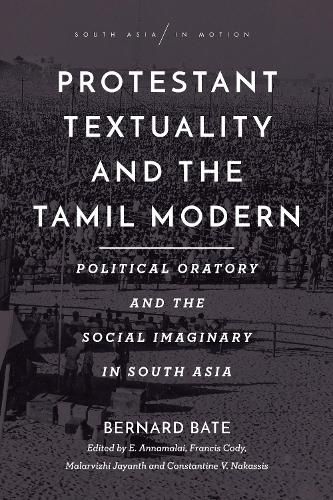Readings Newsletter
Become a Readings Member to make your shopping experience even easier.
Sign in or sign up for free!
You’re not far away from qualifying for FREE standard shipping within Australia
You’ve qualified for FREE standard shipping within Australia
The cart is loading…






Throughout history, speech and storytelling have united communities and mobilized movements. Protestant Textuality and the Tamil Modern examines this phenomenon in Tamil-speaking South India over the last three centuries, charting the development of political oratory and its influence on society. Supplementing his narrative with thorough archival work, Bernard Bate begins with Protestant missionaries’ introduction of the sermonic genre and takes the reader through its local vernacularization. What originally began as a format of religious speech became an essential political infrastructure used to galvanize support for new social imaginaries, from Indian independence to Tamil nationalism. Completed by a team of Bate’s colleagues, this ethnography marries linguistic anthropology to performance studies and political history, illuminating new geographies of belonging in the modern era.
$9.00 standard shipping within Australia
FREE standard shipping within Australia for orders over $100.00
Express & International shipping calculated at checkout
Throughout history, speech and storytelling have united communities and mobilized movements. Protestant Textuality and the Tamil Modern examines this phenomenon in Tamil-speaking South India over the last three centuries, charting the development of political oratory and its influence on society. Supplementing his narrative with thorough archival work, Bernard Bate begins with Protestant missionaries’ introduction of the sermonic genre and takes the reader through its local vernacularization. What originally began as a format of religious speech became an essential political infrastructure used to galvanize support for new social imaginaries, from Indian independence to Tamil nationalism. Completed by a team of Bate’s colleagues, this ethnography marries linguistic anthropology to performance studies and political history, illuminating new geographies of belonging in the modern era.